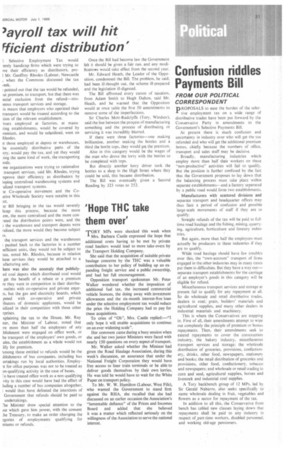Confusion riddles Payments Bill
Page 33

If you've noticed an error in this article please click here to report it so we can fix it.
FROM OUR POLITICAL CORRESPONDENT PROPOSA LS to ease the burden of the selec
tive employment tax on a wide range of distributive trades have been put forward by the Conservative Party in amendments to the Government's Selective Payments Bill.
At present there is much confusion and uncertainty in industry over who will get the tax refunded and who will get the additional premium bonus, chiefly because the numbers of office, transport and sales staff may be decisive.
Broadly. manufacturing industries which employ more than half their workers on these "non-productive" activities will fail to qualify, But the position is further confused by the fact that the Government proposes to lay down that the balancing process must take place within separate establishments—and a factory separated by a public road would form two establishments.
Manufacturers with scattered divisions and separate transport and headquarter offices may thus face a period of confusion and possible large-scale movements of staff if they are to qualify.
Straight refunds of the tax will be paid to runtime road haulage and the fishing, mining, quarrying. agriculture, horticulture and forestry industries.
But again, more than half the employees must actually be producers in these industries if they are to qualify.
While road haulage should have few troubles over this, the "own-account" transport of firms engaged in the other industries may in many cases put them in difficulties. But they have a way out— separate transport establishments for the carriage of an employer's goods in this category will be eligible for refund.
Miscellaneous transport services and storage at present fail to qualify for any repayment at all. So do wholesale and retail distributive trades, dealers in coal, grain, builders' materials and agricultural supplies, and many other dealers in industrial materials and machinery.
This is where the Conservatives are stepping in. First of all, their amendments attempt to wipe out completely the principle of premium or bonus repayments. Then, their amendments seek to extend repayments to cover the construction industry, the bakery industry, miscellaneous transport services and storage; the wholesale distribution of groceries, provisions, confectionery, drinks, other food, newspapers, stationery and books; the retail distribution of groceries and provisions, other food, confectionery, tobacco and newspapers; and wholesale or retail trading in corn and seed, agricultural supplies, horses and livestock and industrial coal supplies.
A Tory backbench group of 12 MPs, led by Sir Gerald Nabarra, also seeks specifically to name wholesale dealing in fruit, vegetables and flowers as a sector for repayment of the tax.
In addition to all this. the Conservative front bench has tabled new clauses laying down that repayments shall be paid to any industry in respect of, part-time workers, disabled personnel. and working old-age pensioners.




























































































































